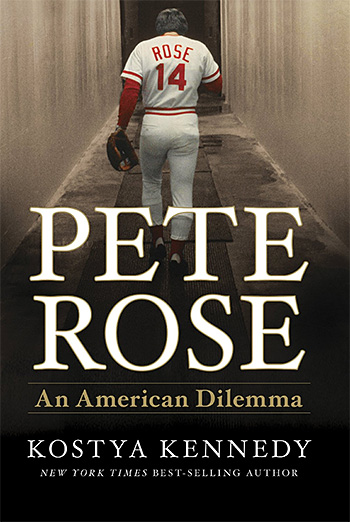What if your greatest strengths were also your greatest flaws? What if the very traits that made you great, and famous and loved, were the same ones that led to your biggest failures and caused people to dislike, or, maybe even worse, pity you? How about if you only knew one approach to life, one that made you a hero in one part of life, and a failure in so many others?
As a baseball fan, for as long as I can remember, and an avid reader for a little less than that, I’ve read more than my fair share of baseball books. The ones I’ve always enjoyed the most are the ones that, while outwardly about baseball, are really about life. “Pete Rose: An American Dilemma” by Kostya Kennedy fits the bill, and is one of the best baseball books I have ever read. Of course, it is much more than just a book about baseball. It is a book about a very flawed man, whose one-size-fits-all approach to life, leads to a story that reads like a Greek tragedy. Kennedy, who many sports fans will recognize from his writing for Sports Illustrated, tells the story masterfully, showing who Rose was and is, on and off the field, and who he seems destined to be until the day he dies.
Pete Rose, who early in his career was dubbed “Charlie Hustle”, played the game the way it was meant to be played. In a sport where even the greatest players take it easy at times, Rose played every game, exhibition or regular season, as if it was his last, and as if he was still trying to prove himself to his father. This single-mindedness made him a star, but also led to his being a poor husband, father, and sibling. It was as if the only way he could live was by ignoring everyone else’s needs. Ultimately, it led to his banishment from the game of baseball and the hall of fame, for gambling on baseball.
Kennedy tells Rose’s story and shows how those who loved him, including his two ex-wives, children and siblings, and those who rooted for him, ignored or even embraced his biggest flaws, as part of the Faustian deal of being part of his life. Given this tolerance for his flaws, along with the help he received in protecting him from the consequences of most of his decisions, one could almost say that Rose never had a chance at coming clean and taking responsibility, after his gambling addiction led to his banishment from the game he loved. Even when confronted with thousands of pages of evidence, Rose remained defiant, convinced that he could talk his way out of this problem as well. Kennedy powerfully shows how the people involved in the investigation, including the literally larger than life lawyer John Dowd, and commissioners Bart Giamatti and Fay Vincent, stood up to Rose and his handlers, showing him and them that, for one of the few times in his life, he would have to pay the price for his actions.
By the time one reaches the later part of the book, he knows that Rose will fail to take advantage of the opportunity to learn from his mistakes. By this point, the reader will be familiar with the many missed opportunities for Rose to right his life, and even wonder whether he wants to. While Kennedy poignantly shows a few too brief moments where a more introspective Rose appears to recognize what he has wrought, he also shows that for Rose, there can be no second chances, in a life lived with lots of hustle, but no brakes.
Americans will give a second chance to almost anyone, provided that they are willing to apologize sincerely or not. Most of the time, a publicly issued mea culpa will make up for almost any sin. Kennedy notes the irony that a man as real as Pete Rose, a man who can not be anyone other than the man he is, no matter the circumstances and consequences, has never been able to offer even a somewhat convincing admission of guilt for what he has done. More than that, Kennedy shows that the very approach that led to Rose being one of the greatest players in baseball history, is the same approach that has cost him so dearly. In the end, it is hard for the reader to muster much sympathy for a man who seems incapable of looking at himself in the mirror, a man who still doesn’t realize that he is is own worst enemy.

No comments:
Post a Comment